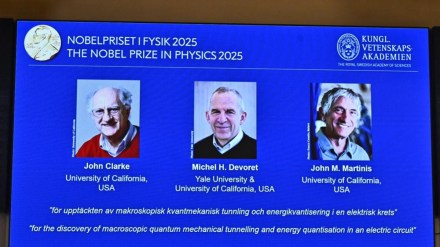The Nobel Prize in Physics has been awarded to John Clarke, Michel H. Devoret and John M. Martinis “for the discovery of macroscopic quantum mechanical tunnelling and energy quantisation in an electric circuit,” the Nobel Academy announced on Tuesday.
“This year’s Nobel Prize in Physics has provided opportunities for developing the next generation of quantum technology, including quantum cryptography, quantum computers, and quantum sensors,” the official statement further read. All three winners are based in the United States.
The Royal Swedish Academy of Sciences said the 2025 Nobel Prize laureates in Physics conducted groundbreaking experiments with an electrical circuit, demonstrating quantum mechanical tunnelling and quantised energy levels in a system large enough to be held in the hand.
Reacting to the announcement, British-born physicist John Clarke said he was “completely stunned”, adding that he had never imagined his work would lead to a Nobel Prize. Clarke is a professor at the University of California, Berkeley.
His co-laureates, Michel Devoret of France and John Martinis of the United States, are both professors at Yale University and the University of California, Santa Barbara.
The Nobel Prize in Physics comes with a total prize sum of approximately $1.2 million, to be shared among the winners.
The Noble in Physics was won by US scientist John Hopfield and British-Canadian Geoffrey Hinton in 2024 for breakthroughs in machine learning that spurred the artificial intelligence boom.
